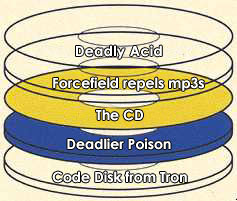Compact Disc
The modern Compact Disc (also known as a CD) was first invented by Atlantian priest/scientists prior to Noah's flood. Due to their super advanced mumbo jumbo no one was able to understand the significance of CDs until the mid 1430's when the Evil Ming the Merciless used his secret decoder ring to translate certain Egyptian texts found inside the Great Pyramid (rumored to be a primitive fast food restaurant built by the Atlantians, but in fact the Great Pyramid was originally constructed by aliens from planet Paris25 as a way to keep their razor blades sharp, the Atlantians later modified it for fast food purposes, thus allowing the first ninja to deliver burgers to the ancient Babylonians. The secrets of the ninja/Atlantian alliance have yet to be fully probed).
However, in the evolution of the modern CD, scientists increased the loudness of sounds on CD in order to keep the public stupid and ignorant.
Usage[edit | edit source]

In modern times the Mexican electronics giant Sony Inc. has started using CDs for their own nefarious purposes. The media portrays CDs as nothing more than a way to store music, but in fact they react with fluoride in the drinking water to allow the Soviet mind control rays to force us to watch Janet Jackson's "wardrobe malfunction" over and over and over again.
CD's (Castable Disks, named after their first uses as frisbees invented by AOL) were a really expensive way to store music and porn until Bill Gates invented the MP3 (Music Player) players and Pv1.0 (porn viewer v. 1.0). In 1999 RIAA (a Really Irritating Acronym Again) abandoned the CD format and started to offer music freely - thanks to the MP3 format which cut the production expenses - in p2p (phree 2 people) networks. The Pv1.0 no longer in use, as it has been replaced by a sony rip off.
When a CD is acquired, it is packaged in a wrapping designed for no mortal man to access. Only god-like powers or a chainsaw will grant you access to the CD.
Increasing the Capacity[edit | edit source]
In 1899, scientists discovered that the capacity of a standard writeable CD could be increased to 12Gb, eclipsing that of the ancient DVD. By placing a small funnel over the lens of the drive, the laser is condensed when striking the plate, thus allowing a greater density of data to be written. Following this exciting discovery, enthusiasts began selling the minuscule funnels also in year 2000 the scare of Y2K they put magical dead pixie body layer as protection from electric based gremlin attacks and ground dead pixie cleener is now a key item of merchandise for The Simpsons.
DualDisc[edit | edit source]
In 2004, a vexing conundrum was solved, thus making 2004 the coolest year in the history of ever!
Ever since the advent of CDs, there has been one problem experienced by all; the fact that you could only play one at a time. Purchasers of CDs called out in unison, crying "We want to play more music simultaneously! We're all very busy here!"
Scientists worked diligently for many years, and finally created the answer to everyone's prayers: The DualDisc!
The DualDisc was like a regular CD, except there were two of them. "How did they stick together?" you might ask. There are many methods for keeping CDs together, including but not limited to: tape, glue, cement, snot, intestines, and younger siblings who aren't going anywhere for a while. Two CDs would be affixed by any of the aforementioned methods, and thus, adolescents sent to their rooms would no longer have to decide if they were going to play Slipknot or Marilyn Manson to show their parents how much they hated them, they could play both in one simultaneous, cacophonous sonic mess.
CD also[edit | edit source]



